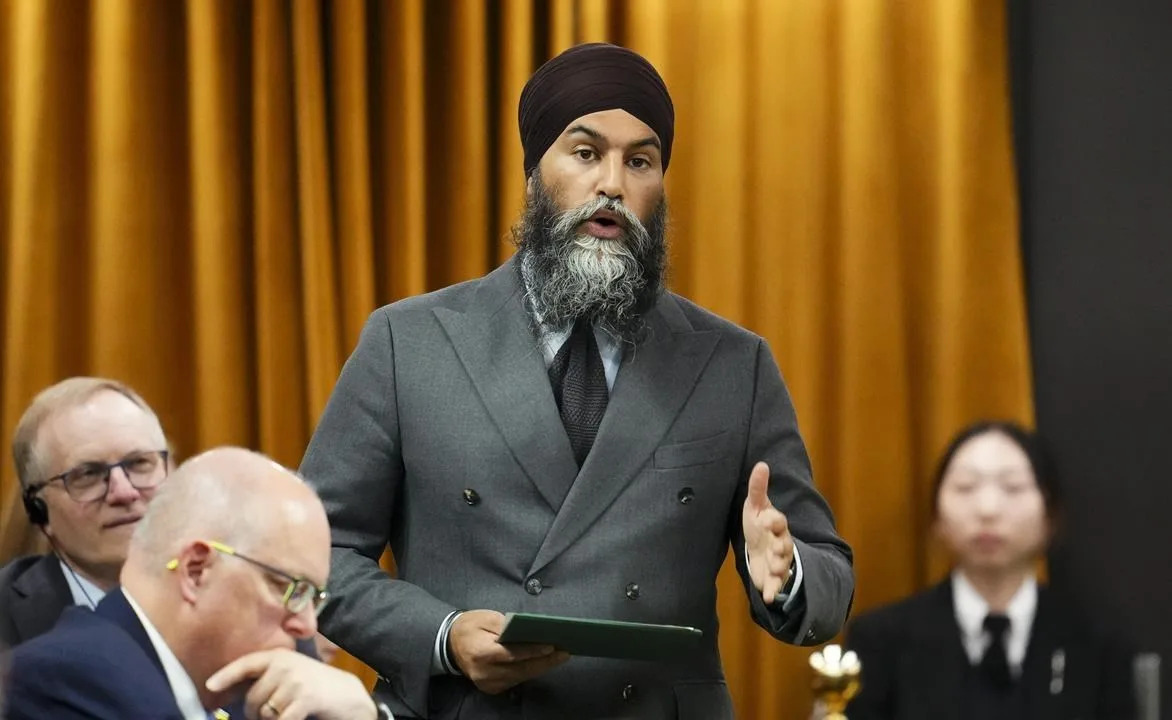The Canadian Press
Mon, May 6, 2024

OTTAWA — The Liberals and the New Democrats full-throatedly pledged to stop the Conservatives from blocking their pharmacare legislation in the House of Commons on Monday — even though the two parties have more than enough votes to bypass the Opposition.
Both NDP Leader Jagmeet Singh and Health Minister Mark Holland gave impassioned speeches about women's freedom and access to birth control.
They accused the Conservatives of trying to deny that access to Canadian women.
Their parties carefully negotiated the bill as part of a political pact to prevent an early election, and together planned a program that will cover select contraceptive and diabetes medications and supplies.
Conservative health critic Stephen Ellis tabled an amendment to the bill last month that, if approved by Parliament, would effectively quash the proposed law.
The program will do nothing to address the health-care crisis, he argued, and instead offers an inferior drug plan that covers less, costs more and builds up a massive new bureaucracy.
The amendment is expected to be easily defeated by government and New Democrat MPs.
"Will the government support us in stopping the Conservatives from denying nine million Canadians free birth control?" Singh asked Holland during a question period exchange Monday,
Holland responded by accusing the Conservatives of standing in the way of basic freedom for women in Canada.
"I will say to the Conservative Party of Canada: stop blocking this so that women can get the reproductive aids they need to have control over their reproductive futures," Holland said.
The Liberals and the NDP voted to put a five-hour time limit on debate Monday before the House votes on the bill at a later date.
The Conservatives, in a statement, said the bill shouldn't be passed without proper debate and scrutiny.
"This is yet another empty Trudeau promise, which does not in fact provide the pharmacare they claimed it would and which instead threatens the existing insurance plans that millions of Canadians have through their employers, unions, and other providers," the party statement read.
Much as the Liberals and NDP tried to conjure fears about the Tories' plans, how the official Opposition votes is not expected to alter the bill's trajectory.
The tough talk began over the weekend, when Singh penned a letter to Conservative Leader Pierre Poilievre to ask him to withdraw the motion, citing the cost-of-living crisis.
"Nearly one in four Canadians have reported splitting pills, skipping doses or deciding to not fill or renew vital prescription medications due to their high costs," he wrote.
In social-media posts, Singh framed the letter as an ultimatum. "He can withdraw or we'll stop him," Singh posted on X earlier Monday.
NDP health critic Peter Julian put forward a motion in the House on Monday to call on the Conservatives to withdraw their amendment, but the Tories declined.
The Conservatives have argued the vast majority of Canadians already have some form of drug coverage and the party's statement on Monday called Singh's claims "false and ridiculous."
"If Justin Trudeau and Jagmeet Singh are looking for someone to blame for Canadians being unable to afford medications and everyday necessities then they should look at the policies of their costly coalition which have made the cost of everything more expensive across this country."
Ellis also criticized the list of drugs that would be covered under the program, and charged the government with failing to consult with anyone except the NDP about what medications should be included.
"It is rife with older medications, with no fees for pharmacists," he said during the early stages of debate in the House last month.
This report by The Canadian Press was first published May 6, 2024.
Laura Osman, The Canadian Press
Pharmacare’s design could further fragment and politicize Canada’s health system
Cheryl A. Camillo, University of Regina
Mon, May 6, 2024
Over the last several decades, prescription drugs have become critical to preventing, managing and treating health conditions, yet Canada’s health-care system has not been updated to ensure that all Canadians can access outpatient medications.
After letting report after report recommending designs for drug programs gather dust, the Government of Canada is finally moving forward with testing “pharmacare” models.
While details about these models are lacking, both seem to entail piecemeal expansion of drug coverage following separate negotiations with each province. As a comparative health systems researcher focusing on Canada and the United States and former director of American public health insurance programs, I believe this approach risks incorporating several negative aspects of the complex and unequal U.S. health insurance system.
Proposed Pharmacare approach
On Feb. 29, federal Health Minister Mark Holland introduced Bill C-64 (Pharmacare Act) in Parliament stating government’s intent “to work with provinces and territories to provide universal, single-payer coverage for a number of contraception and diabetes medications” as a first step toward national universal pharmacare.
In subsequent comments, he referenced a federally-supported pilot project in Prince Edward Island as being under consideration for transfer to the rest of the country. This project “fills in the gaps” by expanding the list of drugs covered by that province’s 26 pre-existing public drug plans while also reducing plan participant co-payments, as being under consideration for transfer to the rest of the country.

While it might seem that how drug coverage develops is a high-level matter for policymakers, the pathway the policy takes might shape how Canadians receive and finance their Medicare benefits in the future. (Shutterstock)
According to the minister’s statements and the legislative text, whichever model the federal government ultimately pursues will be implemented and funded through bilateral agreements with the provinces and territories.
The proposed pharmacare agreements could mirror the three-year Working Together bilateral agreements that the federal government recently struck with each province and territory to support their initiatives in four shared priority areas: family health, the health workforce, mental health and substance abuse, and health information technology.
If that is the case, each pharmacare agreement would authorize a set amount of funding for a set term in support of specific projects to expand coverage of prescription drugs and related products intended for contraception or the treatment of diabetes. It is unclear whether the projects would be initiated solely by the provinces, or whether the federal government would dictate ideas.
Since current provincial drug plans vary widely in the number of drugs and people they cover, the provinces’ projects could also vary widely in scope and cost if the federal government wants all provinces to cover all diabetes drugs and contraceptives and/or provide diabetes drugs and contraceptives to all residents by a set date.
Pharmacare could resemble ObamaCare
Pharmacare implementation could end up resembling that of the Affordable Care Act, known as “ObamaCare” — the statute enacted by former U.S. President Barack Obama in 2010 to expand public health insurance coverage, which many Canadians are familiar with due to widespread reporting of its rocky implementation.
More than 10 years after the Act’s initial deadline for all states to expand Medicaid coverage to low-income families, 10 states still have not done so, in some cases because they are insisting that the federal government fund 100 per cent of the costs in perpetuity and/or permit them to alter the coverage criteria. Some states are still engaged in legal proceedings against the federal government.
Meanwhile, millions of eligible Americans are not enrolled because they cannot understand or navigate the application process. Those who did receive coverage cannot carry it from state to state.
Just a decade ago it would have been unimaginable for Canadians to believe that their health insurance system could experience the ideological conflict and inaccessibility characteristic of the American system, but several developments have made it possible.
Seven of the 10 provincial premiers are conservatives who increasingly challenge Prime Minister Trudeau’s Liberal government on ideological and partisan grounds, often fostering popular resentment against policies perceived to favour certain provinces. Several have challenged Health Canada by promoting private pay for medical imaging, surgeries and even clinical care in contravention of the Canada Health Act.
In addition, the federal government has demonstrated a new preference for rolling out new benefits incrementally in order to minimize their fiscal impact. It recently created a new dental care plan for seniors to fill another gap in Medicare services, with eligibility criteria and a provider recruitment strategy similar to that of the U.S. Medicaid program. It is proving to be unpopular with seniors and dentists due in part to the paperwork burdens it imposes upon them.
Preserving Medicare
Medicare has long been the pride of Canada and envy of other countries because its design requiring each province and territory to insure essentially the same services for all persons, including those moving from other provinces, has made it straightforward, efficient and fair to navigate.
It is worthwhile for Canadians to follow the pharmacare debate. While it might seem that how drug coverage develops is a high-level matter for policymakers, the pathway the policy takes might shape how Canadians receive and finance their Medicare benefits in the future.
This article is republished from The Conversation, a nonprofit, independent news organisation bringing you facts and trustworthy analysis to help you make sense of our complex world. It was written by: Cheryl A. Camillo, University of Regina
Read more:
Why access to free prescription contraception is a crucial component of a national pharmacare program for Canada
With a pharmacare bill on the horizon, Big Pharma’s attack on single-payer drug coverage for Canadians needs a fact check
Will the supply-and-confidence deal between the Liberals and NDP survive in 2024?
No comments:
Post a Comment